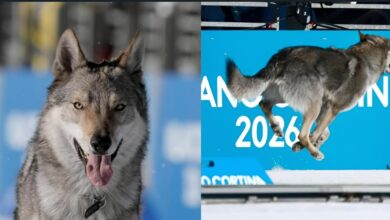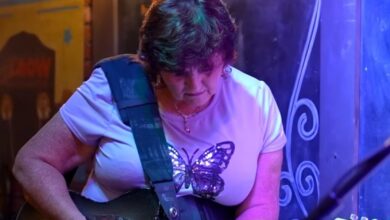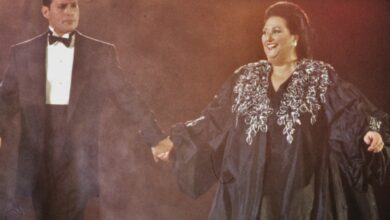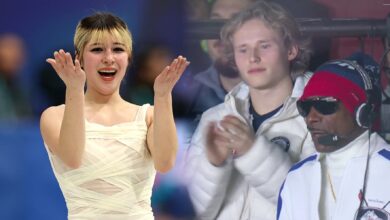KISS Set San Francisco Ablaze: “Deuce” Ignites Winterland in 1975
On January 31, 1975, KISS ignited the stage at San Francisco’s Winterland Ballroom with a performance of “Deuce” that remains one of the most defining moments in their early career. It was a night that revealed their hunger, charisma, and defiance—proof that even before the stadium era, they were already larger than life. Performing in support of Hotter Than Hell, KISS stood before an audience that had seen the likes of Zeppelin, Hendrix, and The Who, and they didn’t just belong—they dominated.
From the first note of “Deuce,” the energy felt volcanic. Gene Simmons’ bass line struck like a heartbeat through the floor, Peter Criss’s snare hits ricocheted around the room, and Paul Stanley’s rhythm guitar carved through the air like a whip. Winterland wasn’t just filled with noise—it was swallowed by it. The audience, initially cautious, quickly surrendered to the chaos as the lights flared and smoke poured from the stage, turning the old ballroom into something closer to a ritual than a concert.
The sound inside Winterland had a special character that night. The venue’s cavernous size turned every cymbal crash into thunder and every shout into an echo that seemed to come from everywhere at once. When Stanley commanded the crowd to “get up and get down,” his voice wasn’t a request—it was law. What followed wasn’t mere participation; it was communion. The band and the audience blurred into one furious, roaring entity, feeding each other’s fire until the roof itself seemed ready to come down.
Visually, the show was stripped down but volatile. Flames burst from the monitors, smoke cannons spat fire, and Ace Frehley’s amp stack crackled with menace. Their makeup glowed under the low amber lighting, and Simmons stalked the stage like a predator finally let off the chain. In “Deuce,” everything about KISS—the look, the attitude, the volume—coalesced into a declaration: they weren’t there to impress the establishment; they were there to overthrow it.
Even in their early days, KISS carried the confidence of conquerors. Stanley’s sharp, metallic tone sliced through the dense mix, while Frehley’s leads soared like fireworks over the battlefield. Watching the footage now, what stands out isn’t just the volume—it’s the precision. Each member held their ground, moving with an unspoken unity that made the chaos look choreographed. They weren’t just a band; they were a four-man army painting their anthem in sound and sweat.
At the center of it all was Simmons, whose bass became both anchor and weapon. His playing that night was gritty but surgical, locking perfectly with Criss’s relentless snare to form the backbone of KISS’s emerging sound. Every thump of the low end added weight to the firestorm, defining what would become the band’s unmistakable groove—a swaggering rhythm that rolled like a machine built from thunder and steel.
Stanley’s stage presence burned as bright as his sequined outfit. With his guitar slung low and his voice echoing through the rafters, he embodied the fusion of showman and rebel. He teased, commanded, and seduced the crowd in equal measure, flashing that trademark smile before launching back into his riffs. That mix of charm and ferocity—half preacher, half provocateur—became the model for every KISS performance that followed.
Then there was Ace Frehley—raw, dangerous, and completely magnetic. His solos were less about perfection than about passion, the sound of someone wrestling lightning into submission. Notes bent, snapped, and screamed as sparks flew from his Les Paul, each phrase a mix of chaos and control. The crowd could feel the risk in every movement, as if the whole show might combust at any second—and that danger made it impossible to look away.
Peter Criss was the unsung hero that night, driving the performance with sheer muscle and swing. His drumming hit like an avalanche but danced like jazz, a blend of power and precision that elevated every song. On “Deuce,” his fills cracked like thunderclaps, giving the track its pulse. By the final crash, Criss looked drenched and triumphant, the physical embodiment of the band’s unrelenting will.
The reaction from the Winterland crowd was seismic. At first, some watched in disbelief—KISS’s theatricality was still a shock to many. But by the song’s final chorus, resistance had turned to reverence. The audience roared, their cheers colliding with the echoing feedback to create a wall of sound that refused to die down. For one electric night, the band that had been dismissed by critics transformed skeptics into converts and turned a ballroom into a battlefield.
What made “Deuce” so defining was its purity. The lyrics—blue-collar grit wrapped in swagger—spoke to anyone who lived fast and worked harder. The performance mirrored that ethos: all pulse, sweat, and heat. It was rock stripped to its core essence, where showmanship and sincerity didn’t cancel each other out but amplified each other into something unstoppable.
The lighting at Winterland amplified the chaos beautifully. With only spotlights and manual gels, KISS managed to turn the stage into a living storm. Red beams sliced through the smoke, white flashes froze the band mid-motion, and by the time Stanley swung his guitar into the song’s closing chord, it felt like the room itself had caught fire. The glow bouncing off their glittered outfits gave the moment a surreal, almost cinematic intensity.
As the final chord rang out, the stage looked like an aftermath—amps humming, smoke lingering, faces streaked with sweat and paint. The band walked off to an uproar that refused to fade. In that brief pause before the next song began, history seemed to hang in the air: four young musicians, hungry and unbreakable, knowing they had just claimed their place among rock’s immortals.
The legend of Winterland ’75 only grew with time. Fans traded bootlegs like sacred relics, retelling the story of that night in hushed tones. When the remastered footage eventually surfaced decades later, it proved every word true: the danger, the brilliance, the unstoppable energy. It wasn’t nostalgia—it was revelation, a reminder of what happens when passion and ambition collide under the glare of hot lights.
Half a century later, that performance of “Deuce” remains one of rock’s purest artifacts—a snapshot of a young band proving they were born to be legends. Every chord, every shout, every burst of fire captured the moment KISS stopped chasing the dream and started living it. Watching it now, it still feels dangerous, alive, and defiant. In 1975, at Winterland, KISS didn’t just perform “Deuce.” They embodied it—and rock and roll was never the same again.





